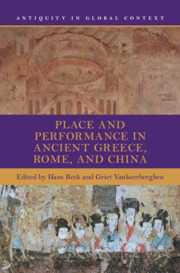Book contents
- Place and Performance in Ancient Greece, Rome, and China
- Antiquity in Global Context
- Place and Performance in Ancient Greece, Rome, and China
- Copyright page
- Contents
- Figures
- Tables
- Contributors
- Series Editors’ Preface
- Editors’ Preface
- Introduction
- Part I Crafting Space and Place
- Part II Performances of Power
- Chapter 3 Power and Its Trappings in the Han and Roman Bureaucracies
- Chapter 4 The ‘Performance’ of Agricultural Labour in Ancient Rome and Han China
- Chapter 5 Foreigners, Spectacles, and Imperial Performance
- Chapter 6 The Maiden and the Mirror
- Part III Urban Places
- Part IV Fringe Places and Endpoints
- Index
- References
Chapter 5 - Foreigners, Spectacles, and Imperial Performance
Nero and Emperor Wu of the Han
from Part II - Performances of Power
Published online by Cambridge University Press: 28 November 2024
- Place and Performance in Ancient Greece, Rome, and China
- Antiquity in Global Context
- Place and Performance in Ancient Greece, Rome, and China
- Copyright page
- Contents
- Figures
- Tables
- Contributors
- Series Editors’ Preface
- Editors’ Preface
- Introduction
- Part I Crafting Space and Place
- Part II Performances of Power
- Chapter 3 Power and Its Trappings in the Han and Roman Bureaucracies
- Chapter 4 The ‘Performance’ of Agricultural Labour in Ancient Rome and Han China
- Chapter 5 Foreigners, Spectacles, and Imperial Performance
- Chapter 6 The Maiden and the Mirror
- Part III Urban Places
- Part IV Fringe Places and Endpoints
- Index
- References
Summary
Zhou Yiqun, in her chapter, draws attention to the performance of power by rulers who, having won military victories, bring the surrendered foreigners into their territories. Both Emperor Wu and Nero entertained foreign ruling groups with elaborate performances that included, in the case of Nero, the emperor himself taking the stage and, in the case of Emperor Wu, an attempt to show how his country was able to best foreigners at their own forms of entertainment. Both emperors were severely criticized by their contemporaries, either for being too militaristic (Emperor Wu) or for failing to uphold Rome’s military values (Nero). Through a careful analysis of these two emperors’ performances involving foreigners (through the eyes of their critics), Zhou Yiqun manages to draw out important contrasts between Western Han and imperial Rome. Like Tian Tian, Zhou notices, in the case of Han China, a strong focus toward material things and monetary cost. Zhou locates this both in Emperor Wu’s motivations to engage with foreigners and in the historians’ critiques of these engagements, and attributes it to a near total lack of appreciation for the cultural achievements of the foreign places surrounding Han China. Nero, on the other hand, seems driven by a desire to absorb some of the cultural values and practices of Parthia and Greece, two places that Rome has subdued, and is therefore willing to defy Rome’s behavioral codes.
Keywords
- Type
- Chapter
- Information
- Place and Performance in Ancient Greece, Rome, and China , pp. 161 - 196Publisher: Cambridge University PressPrint publication year: 2024

